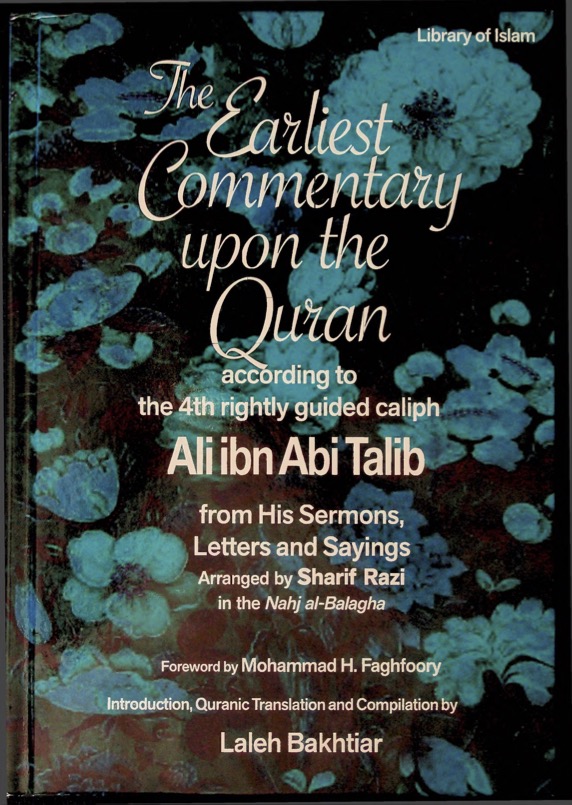
A scholar states: … the Imam s teachings, which express his spiritual ethos, should be read essentially as creative interpretations of the Quranic revelation. Thus, it is no surprise that these became the first and, thus, the earliest commentary upon the Quran. Most historians have said that the first commentary on the Quran was made by Ali s paternal first cousin, Abdullah Ibn Abbas (619-687CE). Yet Abdullah Ibn Abbas claims to have learned the science of interpretation from his older first cousin, Ali. There are over 100 commentaries on the Nahj al-Balagha where the commentators place Quranic verses under the words of the Sermons, Letters and Sayings as reflections of the Quran or which are specific commentaries by Ali himself on certain verses. However, they had not put the Quran first and added words from his Sermons, Letters and Sayings as commentary upon these verses as this Commentary does. The Commentary consists of the entire English translation of The Sublime Quran with excerpts from the Nahj al-Balagha relevant to the specific verse or verses placed following the verse(s). This Commentary clearly shows the truth of the saying of the Prophet, peace and the mercy of God be upon him, leaving no room for doubt that Ali is with the Quran and the Quran is with Ali. They will not separate from each other until they return to me (the Prophet, peace and the mercy of God be upon him) at the paradisal pool. It was from following the Quranic sunna of the Prophet that Ali ibn Abi Talib learned the importance of being a fair and just person. This text will show example after example of Ali s fairness as he became a fair and just person through his own personal efforts first before guiding others in his attempt to create a fair and just society. Yet we find that once Ali ibn Abi Talib, the paragon of justice, was chosen by the people to be the 4th Rightly Guided caliph, certain words creeped into his Sermons, Letters and Sayings which do not reflect his sense of justice and fairness. They were clearly added over time by those who wished to denigrate Ali as well as all women. In the Introduction we detail the problem of injustice against all women and exonerate Ali from having had any part in the discrediting of all women. Interestingly enough, the arguments come from the same Nahj al-Balagha text, but follow the Quranic dictum say what is fairer (Q17:53). In this case, it would be to follow the words that clearly respect the reputation of Ali ibn Abi Talib, a man of wisdom and justice. My challenge to the reader is to undertake the same exercise I have taken. That is, to place the closest words from the Nahj al-Balagha (Path of Eloquence) that reflect the Quranic verses underneath the specific Quranic verse(s) as a commentary upon that particular verse. The person who does this will find that there are no Quranic verses to which one can apply the forged words denigrating women. The person who accepts this challenge will have to conclude, as I have done, that the words that mis-characterize all women could not have been said by either the Prophet, peace and the mercy of God be upon him, or Ali ibn Abi Talib as both were models of fairness and justice. Those scholars who know their self and have morally healed, have to either indicate that the spurious words slandering all women refer to some women (not one woman) or be left out of the Nahj al-Balagha completely because the words neither reflect the Quranic revelation nor sunna of the Prophet as a commentary on the Quran should do. Otherwise, as we will show, the Quran commands: … sit not with the folk, the ones who are unjust. (Q6:68). The Quran commands that women should not sit with or learn from the unjust, those who continue to make mockery of the great paragon of justice, Ali ibn Abi Talib and all women.
Download : Earliest Commentary Upon the Quran According to the 4th Rightly Guided Caliph Ali ibn Abi Talib.pdf



